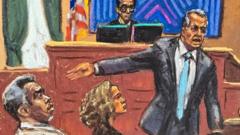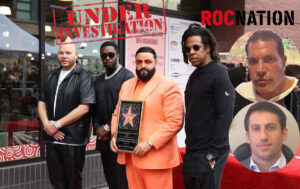As deliberations loom, both sides summarize their arguments, setting the stage for a significant legal outcome.
**Diddy's Defense Declares Trial a 'Farce' as Closing Arguments Presented**

**Diddy's Defense Declares Trial a 'Farce' as Closing Arguments Presented**
In a high-profile sex trafficking and racketeering case, Sean "Diddy" Combs’ lawyers argue the charges exaggerated and criminalize consensual relationships.
The contentious trial involving Sean "Diddy" Combs has reached a pivotal stage as his legal counsel asserts that the allegations against him are exaggerated and mischaracterized. In a passionate closing statement, attorney Marc Agnifilo described the proceedings as a “fake trial,” emphasizing that the lifestyle of his client and his former partners—including consensual sexual interactions—should not be vilified by the government.
Combs has pled not guilty to serious charges, including sex trafficking and racketeering, which his defense team claims stem from a misunderstanding of his relationships. During his lengthy four-hour argument, Agnifilo pushed back against the narrative that Combs exploited or coerced women for his pleasure. He labeled the prosecution's claims as a distortion of Combs' personal life, comparing it instead to the consensual practices between adults, which he contended should not be criminalized.
Agnifilo focused on the testimonies of Combs' ex-girlfriends, particularly Casandra Ventura and an anonymous witness, referring to Ventura’s tumultuous relationship with Combs as “one of the great modern love stories.” He argued that Ventura, who had previously settled a civil lawsuit against Combs for alleged physical abuse, was not a victim but a participant in their lifestyle choices. He further attempted to discredit the prosecution's evidence, including videos supposedly depicting Combs’ violent behavior, stating that the context of the incidents was misunderstood.
The government, led by prosecutor Christy Slavik, has accused Combs of leveraging his wealth and power to manipulate women, alleging a history of drug use, violence, and coercion to facilitate sexual activities. Slavik painted a picture of systemic abuse, illustrating how the alleged victims were entrapped by their circumstances. In her five-and-a-half hour address, she urged jurors to recognize the intertwining of violence and coercion within the context of the accused’s relationships.
As the trial concluded its arguments, prosecutor Maurene Comey shifted gears, firmly asserting the credibility of the accusers and questioning the defense's accusations of fabrication. Comey argued that Ventura’s decision to pursue legal action was not indicative of deceit, noting that the risks associated with perjury were not worth the potential gains. Comey reinforced that the very essence of violence permeated every alleged incident, making it inseparable from the alleged sexual activities.
With jurors expected to receive instructions from the judge this coming Monday, the trial looms as a significant moment not only for Combs but also for discussions surrounding consent, power dynamics, and the legal definitions that govern relationship practices. Combs faces possible life imprisonment if convicted of the most severe charges. As the case unfolds, its implications bear weight on the legal landscape regarding sexual consent and trafficking narratives.




















